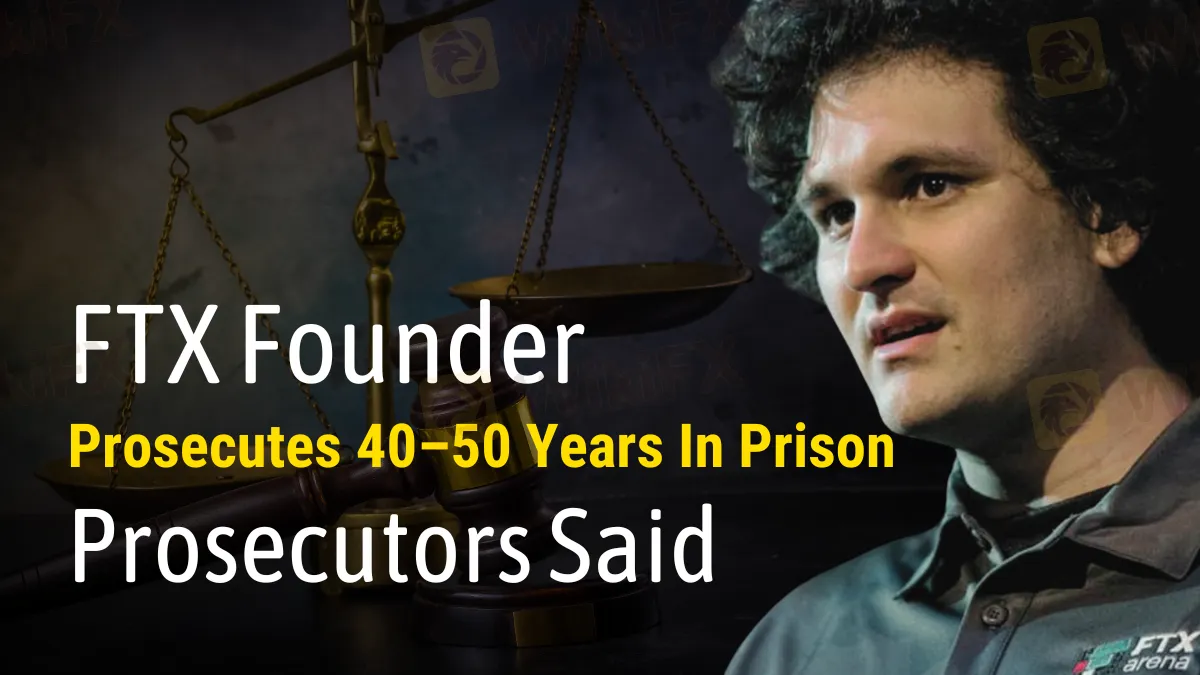简体中文
繁體中文
English
Pусский
日本語
ภาษาไทย
Tiếng Việt
Bahasa Indonesia
Español
हिन्दी
Filippiiniläinen
Français
Deutsch
Português
Türkçe
한국어
العربية
FTX Founder Prosecutes 40–50 Years In Prison, Prosecutors Said
Abstract:Sam Bankman-Fried, a prominent figure in FTX, is currently facing the prospect of a 40–50-year prison term for what prosecutors label as "historic fraud." This situation highlights the shifting landscape of ethics and risks in the cryptocurrency domain.

FTX's face, Sam Bankman-Fried, is part of a tale about the turbulent and closely watched cryptocurrency market. Bankman Fried, a pioneer of Bitcoin, was detained and subsequently released on charges of fraud and conspiracy. Federal investigators expect Bankman-Fried to serve 40–50 years for his “historic fraud.” The case recounts a famous cryptocurrency owner's downfall and warns of the risks and moral dilemmas of digital money's rapid evolution.
Bankman Fried's Bahamas-to-US extradition action disclosed FTX's alleged mismanagement and fraud in December 2022. According to the prosecution, Bankman-Fried was in charge of carrying out a financially significant scheme. From 2017 to 2022, he may have misused $10 billion from investors and consumers. This financial instability shook Bitcoin and ordinary investors.
Bankman-Fried's offenses were complex, including deception of investors, forging the papers, stealing from customers, and making unlawful payments to political parties, as the prosecutors' statement before the court explained. Prompting attention are the claims of more than $100 million in illicit political contributions and $150 million in bribes to Chinese authorities, underscoring the magnitude and influence of Bankman-Fried's conduct. Such charges provide a picture of a concerted attempt to take advantage of and control the political and economic structures for one's benefit.

Bankman-legal Fried's team has resisted the suggested punishment, even in light of the seriousness of these allegations. For a first-time, nonviolent offender, they contend that the probation office's original recommendation of a sentence of 100 years is too severe. Instead, emphasize Bankman-Fried's health difficulties and early Bitcoin technology ambitions in a shorter sentence. This defense tale aims to portray Bankman-Fried as a skilled scam artist turned dumb businessman whose ambitions deceived him.
A discussion has ensued regarding the cryptocurrency industry's ethics and regulations in response to the FTX failure and subsequent legal proceedings against Bankman-Fried. The case raises several intriguing concerns concerning accountability, investor protection, and the role of digital currency within the broader economic framework. With the approaching sentencing date, anticipation for the verdict is palpable among the general public and the cryptocurrency industry. It might change how the courts handle financial misbehavior, especially with new technology like cryptocurrency.
The fallout from FTX and the legal complications encountered by Bankman-Fried illustrate the precarious nature of confidence in the Bitcoin industry. The statement underscores the need for enhanced supervision and moral principles to safeguard investors and guarantee the steadiness of virtual banking networks. With the outcome of the Bankman-Fried case, the cryptocurrency market will probably be affected for some time, perhaps influencing future investor confidence and government regulations.

Disclaimer:
The views in this article only represent the author's personal views, and do not constitute investment advice on this platform. This platform does not guarantee the accuracy, completeness and timeliness of the information in the article, and will not be liable for any loss caused by the use of or reliance on the information in the article.
Read more

Authorities Alert: MAS Impersonation Scam Hits Singapore
MAS scam alert: Scammers impersonate officials, causing $614K losses in Singapore since March 2025. Learn how to spot and avoid this impersonation scam.

Billboard Warns of Crypto Scams Using Its Name – Stay Alert!
Billboard warns against fake crypto scams using its brand. Learn how to spot fraud and protect yourself from fake promotions.

Rising WhatsApp Scams Highlight Need for Stronger User Protections
UK consumers lose £2,437 on average to WhatsApp scams. Revolut demands stricter verification and AI monitoring to combat rising fraud on Meta platforms.

Interactive Brokers Launches Forecast Contracts in Canada for Market Predictions
Interactive Brokers introduces Forecast Contracts in Canada, enabling investors to trade on economic, political, and climate outcomes. Manage risk with ease.
WikiFX Broker
Latest News
The Withdrawal Trap: How Scam Brokers Lure Victims into Paying More
FCA to Investors: Think Twice Before Trusting These Brokers
Trump\s tariffs: How could they affect the UK and your money
Trump gambles it all on global tariffs he\s wanted for decades
TradingView Brings Live Market Charts to Telegram Users with New Mini App
Trump tariffs: How will India navigate a world on the brink of a trade war?
Interactive Brokers Launches Forecast Contracts in Canada for Market Predictions
Authorities Alert: MAS Impersonation Scam Hits Singapore
Stocks fall again as Trump tariff jitters continue
IG Group Acquires Freetrade for £160M to Expand UK Investment Market
Currency Calculator







